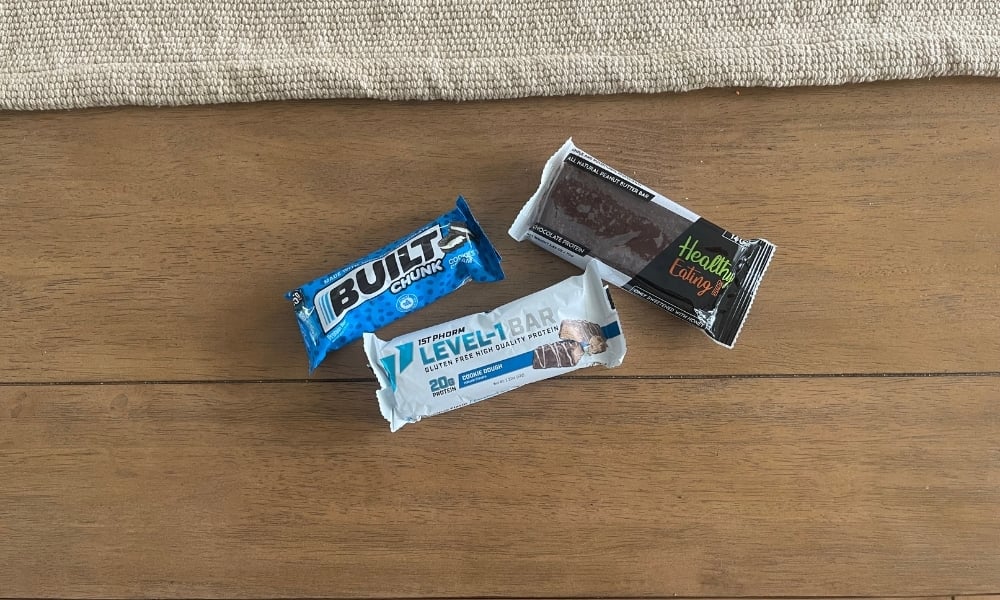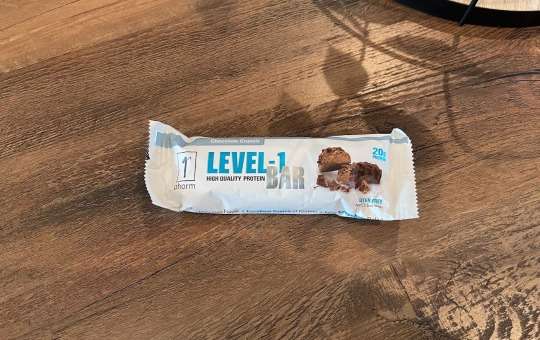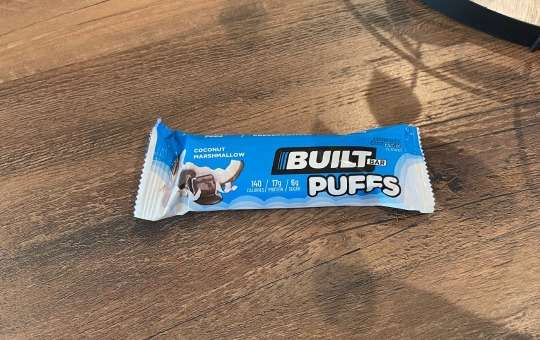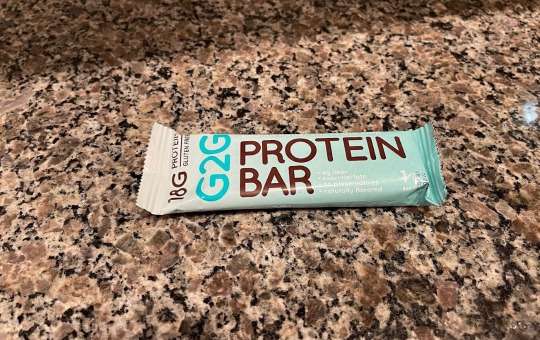For those who are tracking and counting macros, hitting your daily protein target can often be one of the biggest roadblocks to success. Particularly for those who have never focused on their protein intake before, their unique protein target might shock them at first.
I hear from clients all the time that there’s no way they can eat that much protein, but the truth of the matter is that it just takes a little knowledge and creativity and you’ll soon see that hitting your target isn’t as hard as you originally thought.
One of the best hacks for getting your protein in is to take advantage of protein powders, protein bars, and other protein-packed macro-friendly snacks and foods. Of course, don’t want to just grab any old protein product off the shelf, you want to make sure that it’s healthy and macro-friendly, too.
So, for those who want to lose weight eating protein bars (learn about the best protein bars for muscle gain and weight loss) or if you're looking to work on body recomposition through macros counting, there's something for everyone on this list.
In this article, I’m sharing my favorite protein bars for macros and why I love them.
Summary of The Top-Rated Protein Bars for Macros
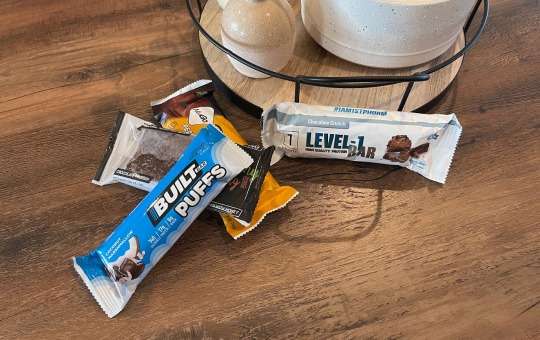
Bar | Protein | Carbs | Fats | Sugar | Calories |
|---|---|---|---|---|---|
20g | 19g | 13g | 8g | 260 | |
17g | 12g | 2.5g | 6g | 140 | |
18g | 25g | 14g | 15g | 300 | |
12g | 25g | 6g | 14g | 200 | |
10g | 19g | 5g | 6g | 150 | |
10g | 27g | 6g | 15g | 200 | |
15g | 19g | 8g | 5g | 210 |
Are Protein Bars Macro-Friendly?
Yes, there are certain protein bars that are incredibly macro-friendly and will make reaching your daily protein intake so much easier and more convenient. The term “macro-friendly” simply refers to a food that contains a balanced ration of all three macronutrients: protein, carbs, and fats. Typically, when referring to a protein bar this indicates a high protein content.
In general, when looking for the best protein bars for macros, we’re looking for a high protein content and relatively low fats and carbs. All of the protein bars that made my list fit the bill, but all have different macros which means you can use and adapt them to fit your specific macro needs.
What to Look for When Choosing a Macro-Friendly Protein Bar
You are inevitably going to feel overwhelmed when looking at your options for protein bars, no matter the specific goals you have in mind. However, macro-friendly bars can be found by checking each bar’s labels which tell you what ingredients and ratio of macronutrients are in the bar.
Transparent Ingredients
Perhaps the number one rule of following a macro diet is choosing foods with simple, clear ingredients. Macronutrient diets are focused on macronutrients, so the ingredients you encounter should also be macronutrient-focused. Look for protein bars that have ingredients you can easily read and identify, like soy protein, wheat flour, whole eggs, vanilla, etc. There may be some added ingredients that you don’t recognize, too, but avoid bars that have a lot of unreadable ingredients, like erythritol, allulose, gum arabic, oligofructose, etc.
A Reputable Brand
It always helps to look at protein bar brands you’ve heard of before the other guys. Of course, there may be lots of newer brands on the market that work with the macro diet, but newer options sometimes take a couple of months and even years to revise their ingredients and get the macro diet ratio right.
The Right Amount of Protein
Protein bars are made to be high in protein, so you should look for bars that are truly full of protein. Always look at bar labels to see how many grams of protein are included versus how many grams of fat and carbs are included. Every person that counts macros will have a different desired ratio of proteins to fats to carbs, but a good protein bar will always give you more protein than fats and usually more protein than carbs.
The Seven Best Macro Protein Bars
Of course, there are tons of options for protein bars out there, but we want to highlight the top choices for macros so you can hit your daily protein intake goals. Plus, most of these are staples in my diet and I’m excited to share them with you.
1st Phorm Level-1 Protein Bar
The Level-1 protein bars by 1st Phorm are real protein bars that are genuinely high in protein content. All of these bars have 20 grams or more of protein, and they contain more protein than or an equal amount of protein as carbs.
The Level-1 Bars come in tasty flavors from peppermint bark to apple crisp and birthday cake, and real users of the bars rate them as some of the best tasting protein bars out there. The only downside to the Level-1 Bars are the higher amounts of saturated fats in them than other options as saturated fats should be limited in a macro diet, and unsaturated fats are more desirable to consume.
Pros
Cons
2. Built Bars
Use "FHM10" for 10% off
Built Bars are another great protein bar option with tons of bars high in protein and low in fats and carbs. For example, the Churro Puffs Bars come with a ratio of 17 grams of protein to 14 grams of carbs to just 2.5 grams of fats. They also use real ingredients that aren’t processed, like real dark chocolate instead of an imitation chocolate.
These bars come in great flavors from coconut almond to salted caramel and raspberry. When you buy the bars online, you can get a sampler mixed box to try every flavor, or you can build your own box with your favorite flavors. However, since Built Bars have low carb counts, they aren’t the best option for endurance athletes or a good meal replacement option for anyone on a macro diet and should be used as a snack only.
Pros
Cons
Use "FHM10" for 10% off
3. G2G Protein Bars
G2G protein bars are all gluten-free and contain 18 grams of protein each. These bars also use organic ingredients that are easy to identify, like freshly ground peanut butter, honey, and certified organic gluten-free oats. G2G bars come in flavors like peanut butter chocolate chip, almond chocolate chip, and almond oatmeal cookie, although all bars contain nuts and are not suitable for those with peanut or almond allergies.
G2G bars are unique in that they are kept refrigerated, making them fresher than most other bars. However, this also makes it difficult to keep the bars fresh on the go unless you use a portable cooler.
Pros
Cons
Use "fitmomma10" for 10% off
4. NuGo Protein Bars
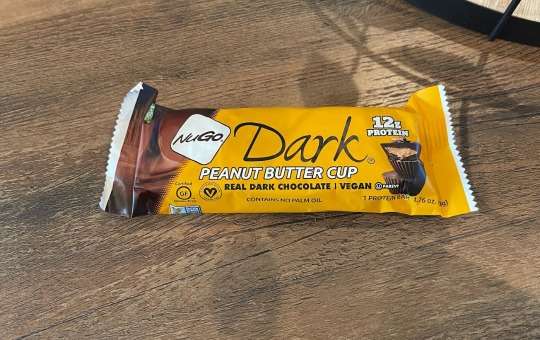
NuGo protein bars always use real dark chocolate made of cocoa butter and not palm oil like some other bars do. This ensures that NuGo bars are smooth in texture and taste great. Some popular NuGo flavors include chocolate pretzel, vanilla yogurt, and brownie crunch.
NuGo bars come in vegan and nut-free options for those with allergies and sensitivities. They are also designed for those who follow Macro diets for weight loss and include a ratio of high protein to low fats and low carbs. However, these bars usually come with smaller amounts of protein than other brands with only 12 to 16 grams of protein instead of 20 or more.
Pros
Cons
5. Orgain Protein Snack Bar
Made with only organic ingredients, Orgain Protein Snack Bars are also certified gluten-free, kosher, non-GMO, and vegan. Orgain bars come in flavors including chocolate brownie, chocolate chip cookie dough, peanut butter, peanut butter chocolate chunk, s’mores, and chocolate coconut, all of which have been rated highly flavorful by real customers.
Orgain bars are not designed to be meal replacements and are best eaten as snacks. They are also somewhat low in protein compared to other bars with 10 grams of protein per bar, and they usually follow a macronutrient ratio of 30% proteins to 50% carbs to 20% fats.
Pros
Cons
6. Skout Organic Protein Bars
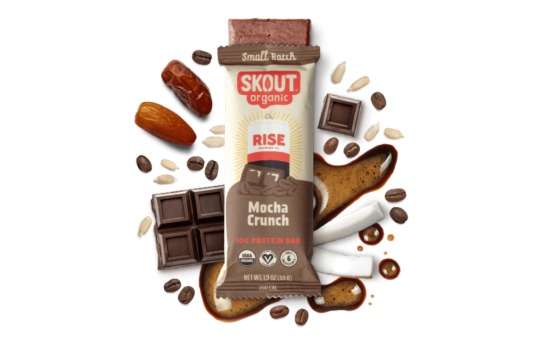
Also certified organic, vegan, gluten-free, and kosher are Skout Organic protein bars. Made of only 6 simple ingredients each, they come in flavors including chocolate cherry, coconut vanilla, salted chocolate, and peanut butter. When ordered online, you have the option of getting a subscription box for Skout Organic bars, making it easy to get your protein bar supply delivered right to you monthly.
Skout Organic bars are protein bars with a ratio of high protein, moderate carbs, and low fats. For example, the chocolate cherry bars have 10 grams of protein, 31 grams of carbs, and 4.5 grams of fat. This makes these bars good for some endurance athletes and those on macro diets to lose weight but not so much for those looking to build muscle since bodybuilders would desire higher amounts of protein.
Pros
Cons
7. Healthy Eating On The Go
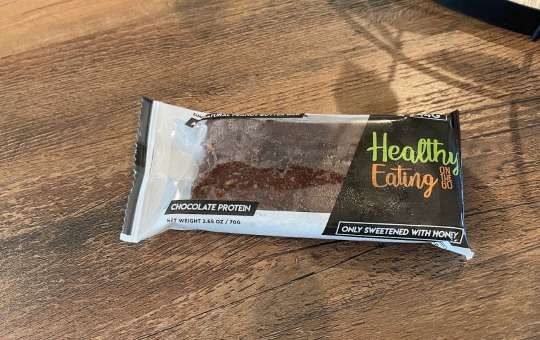
Use code FHM for 12% off!
Healthy Eating On The Go bars are boasted to be safe snacks for anyone from children to the elderly and even pregnant women. Also made for snacking on the go, these bars are made to be shelved at room temperature for up to eight months at a time. Some top flavors by Healthy Eating On The Go include chocolate oat, peanut, and cranberry.
Healthy Eating On The Go bars are all gluten-free and made with natural sweeteners like honey. However, these bars tend to be high in carbs in comparison to proteins, making them most suitable for endurance athletes on macro diets. Most of the Healthy Eating On The Go bars include only 9 or 10 grams of protein.
Pros
Cons
Frequently Asked Questions
Are Protein Bars Good for You to Lose Weight?
Protein bars are a good snacking and meal replacement option for those looking to lose weight. Protein bars that are made with simple, clear ingredients and have a label that shows a high amount of protein and a low amount of carbs and fats are specifically best for those losing weight on a macro diet. Even after reaching weight loss goals, many people continue to eat protein bars to maintain a healthy weight and lifestyle.
Are Protein Bars Good for Muscle Gain?
Protein bars are excellent snacks to eat after intense exercise if you are looking to gain muscle mass. This is because protein is the main building block for muscles, and eating snacks and meals high in protein after workouts can give your muscles the building materials they need to repair and grow. If you’re interested in eating protein bars for muscle gain, choose bars that are truly high in protein and low in fats and carbs to make sure you gain muscle and not excess fat from a bar.
Is It OK to Eat Protein Bars Every Day?
It is perfectly fine to eat a protein bar a day as long as the bar contains healthy ingredients and a minimal amount of added sugars and saturated fats. Plenty of people consume protein bars and shakes daily to build and maintain their muscles after workouts and to make sure they are hitting their protein goals. The only reason it would not be okay to eat a protein bar every day is if the bar contained high amounts of things like high-fructose corn syrup, sugar, or artificial sweeteners because these ingredients can raise a person’s risk of diabetes and obesity.
Can I Eat Protein Bars for Breakfast?
Yes, you can eat a protein bar for breakfast in lieu of cereal or pastries when you are on the go. It is recommended that you still eat fresh foods for breakfast when possible, like eggs and fresh fruit. However, some protein bars may include unhealthy ingredients like added sugar and saturated fats, and these should be avoided even for breakfast.
The Bottom Line
Protein bars are great snacks and meal replacements for those on macro diets, whether your diet is aiming to help you lose weight, gain muscle, or maintain a healthy weight. It’s important to check the labels of all protein bars you consume though, as some protein bars aren’t compatible with a true macro diet. Good protein bars for macronutrient diets are those that are high in protein, high or moderate in carbs, and low in fats.
As with any part of the macro diet, make sure that the foods you consume adhere to a good macro diet ratio. This ratio will vary based on your specific dietary needs but remember that a good macro diet will follow a ratio similar to that of 30% proteins to 20% fats to 50% carbs. When you choose protein bars that follow this type of ratio, you can stick to your diet and achieve your health-based goals.
